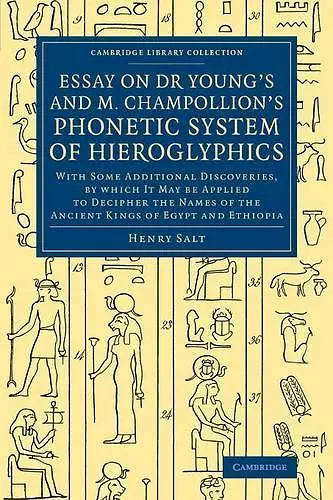Essay on Dr Young's and M. Champollion's Phonetic System of Hieroglyphics
With Some Additional Discoveries, by Which It May Be Applied to Decipher the Names of the Ancient Kings of Egypt and Ethiopia
Format:Paperback
Publisher:Cambridge University Press
Published:4th Dec '14
Currently unavailable, and unfortunately no date known when it will be back

This 1825 publication, featuring Salt's reproductions and explanations of inscriptions, made a valuable contribution to the understanding of Egyptian hieroglyphics.
Appointed Britain's consul-general in Egypt in 1815, Henry Salt (1780–1827) involved himself deeply in the excavation of several historic sites and the collection of numerous antiquities. This 1825 publication, featuring Salt's careful reproductions and explanations of inscriptions, made a valuable contribution to the understanding of Egyptian hieroglyphics.Appointed Britain's consul-general in Egypt in 1815, Henry Salt (1780–1827) involved himself deeply in the excavation of several historic sites and the collection of numerous antiquities. The most notable of these, found at Thebes, was the colossal bust of Rameses II which was acquired by the British Museum and is believed to have inspired Shelley's 'Ozymandias'. This 1825 publication, featuring Salt's careful reproductions and explanations of various inscriptions, made a valuable contribution to the understanding of Egyptian hieroglyphics. Following the innovative work on the Rosetta Stone carried out by Thomas Young, and the celebrated decipherment presented in 1822 by Jean-François Champollion, Salt helped to further elucidate the hieroglyphic alphabet, although later research has disproved some of his conclusions. A postscript notes how Champollion's 1824 Précis du système hiéroglyphique des anciens Égyptiens (also reissued in this series) confirms several names of Egyptian gods and pharaohs which Salt had independently deciphered.
ISBN: 9781108078207
Dimensions: 229mm x 152mm x 6mm
Weight: 150g
94 pages